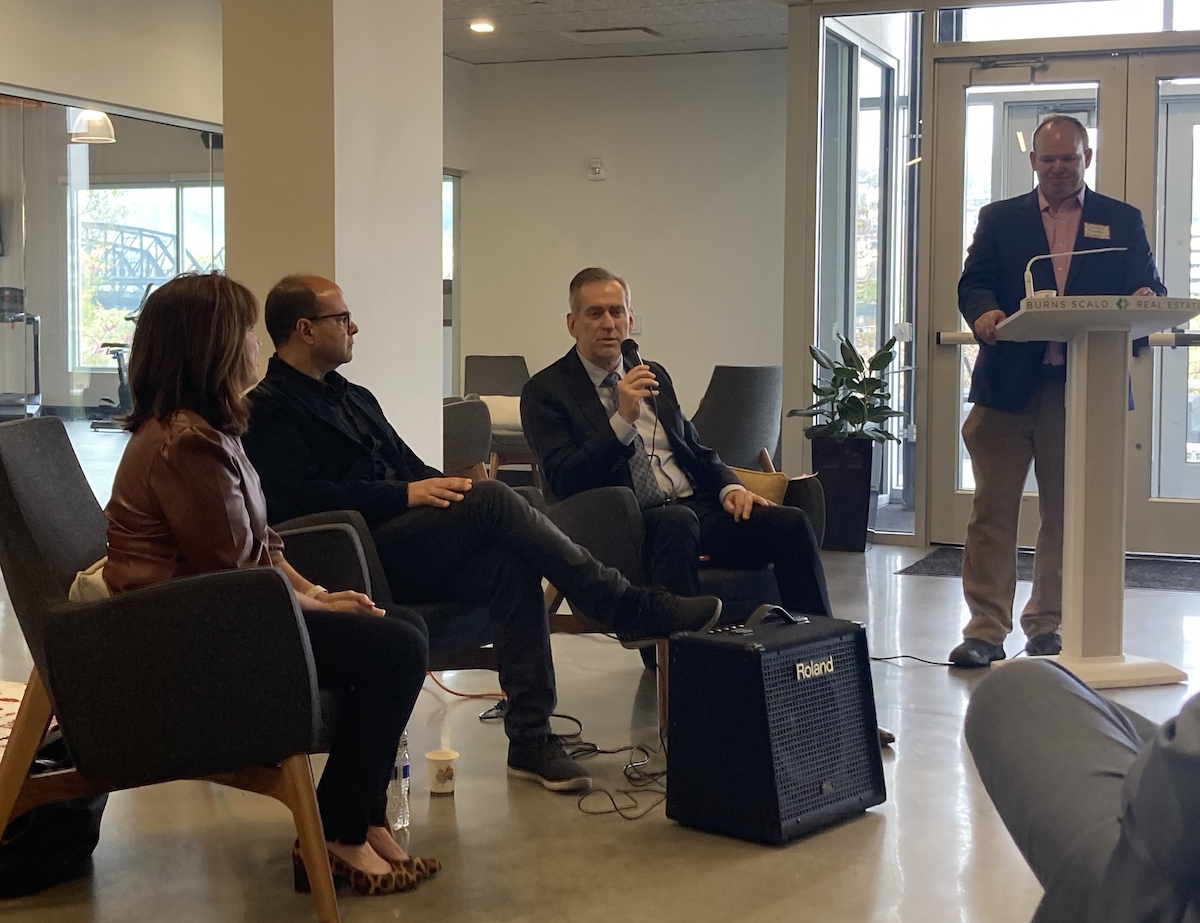During a BioBreakfast panel on Tuesday morning, part of Pittsburgh’s XchangeInnovation Week, the life sciences CEOs shared their pandemic experiences, why they chose to do business in this region, and what advice they had for anyone considering starting or working at a life sciences company.
In Whalen’s case, one of the biggest changes was suddenly needing to conduct clinical trials remotely for her company’s drug designed to treat cytokine release syndrome, or CRS. At the same time, Whalen said that the pandemic made awareness of CRS — which occurs when a person’s immune system responds to infection or immunotherapy drugs more aggressively than it should — mainstream, due to how many COVID patients it impacted.
“Everybody started to understand truly how dangerous this is,” Whalen said. “It’s your body reacting to the virus. A hallmark of cytokine release syndrome is hypotension and acute respiratory distress and we all know that the people who die of influenza and COVID die from acute respiratory distress.”
Funding changes and challenges
The pandemic also prompted changes to startup finances, as Stephan described the decline in investing seen post-2021 as a “COVID hangover.” Yet Whalen said the increased understanding combined with the realization that there was an urgent need in the market actually helped the company in fundraising. In 2021, CytoAgents was awarded $3.6 million in funding from the National Institute of Allergy and Infectious Diseases and the Richard King Mellon Foundation’s Pandemic Solutions Package. The interest and support from investors, she said, funded the clinical trials.
“There’s no question [that] a variety of things helped propel us to raise the funds for our Phase 1 trial,” Whalen said.
Although the needs brought on by COVID were an asset in Whalen’s journey, other panelists recalled having to get creative to raise money. Even now, attendees said, they’re advised to seek funding outside of Pittsburgh. (We’ve heard versions of this complaint before.)
“You’ve got to get on a plane, go to New York, go to San Francisco go to Boston,” said Promethean LifeSciences COO Christian Manders, who moderated the conversation. “That’s where the money is and honestly, even Philadelphia — they get on the train to go up or fly out. That’s where the money is.”
Pitching advice
In addition to being willing to travel, Stephan advised those seeking out funding to know their audiences and always approach investors with a story to show that the product their pitching meets a pressing need. If pitching isn’t your strong suit, Stephan said, there’s no shame in finding a person or partner who can help you make your case to potential investors.
“If you’re not that person, just go find that person and put that person next to you, and then ask that person to help you put the next three people around you and just keep going like that,” Stephan said. “And ultimately remember that data must support the claims that you’re making about the future product.”
Pineault reminded attendees that Murphy’s Law very much applied to the world of business, meaning that anything that could go wrong would go wrong. So, he said, even when things seem to be going in your company’s favor, it never hurts to have a backup plan and try to create a safety net for the inevitable hard times.
“If you think you’re going to need $1 million, go for $2 million, if you think you’re going to need $2 million go for $4 million,” Pineault said.
What’s possible
For any young entrepreneur, the panelists said to remember that passion was important, but considering the high stakes, healthwise, it’s important to keep the real-world consequences for patients in mind. Always, Stephan told attendees, you have to do the work and be accountable.
“Build a great company and focus and do what you can control and hopefully, at some point [you’ll] be able to point at it and say what it is possible here in Pittsburgh and create something that will attract people that they can draft off of,” he said.
Atiya Irvin-Mitchell is a 2022-2024 corps member for Report for America, an initiative of The Groundtruth Project that pairs young journalists with local newsrooms. This position is supported by the Heinz Endowments.Before you go...
Please consider supporting Technical.ly to keep our independent journalism strong. Unlike most business-focused media outlets, we don’t have a paywall. Instead, we count on your personal and organizational support.
3 ways to support our work:- Contribute to the Journalism Fund. Charitable giving ensures our information remains free and accessible for residents to discover workforce programs and entrepreneurship pathways. This includes philanthropic grants and individual tax-deductible donations from readers like you.
- Use our Preferred Partners. Our directory of vetted providers offers high-quality recommendations for services our readers need, and each referral supports our journalism.
- Use our services. If you need entrepreneurs and tech leaders to buy your services, are seeking technologists to hire or want more professionals to know about your ecosystem, Technical.ly has the biggest and most engaged audience in the mid-Atlantic. We help companies tell their stories and answer big questions to meet and serve our community.
Join our growing Slack community
Join 5,000 tech professionals and entrepreneurs in our community Slack today!

The person charged in the UnitedHealthcare CEO shooting had a ton of tech connections

From rejection to innovation: How I built a tool to beat AI hiring algorithms at their own game

Where are the country’s most vibrant tech and startup communities?



